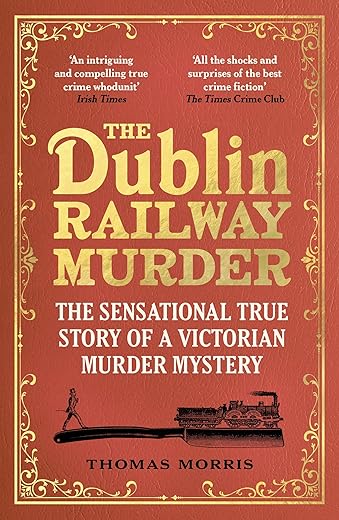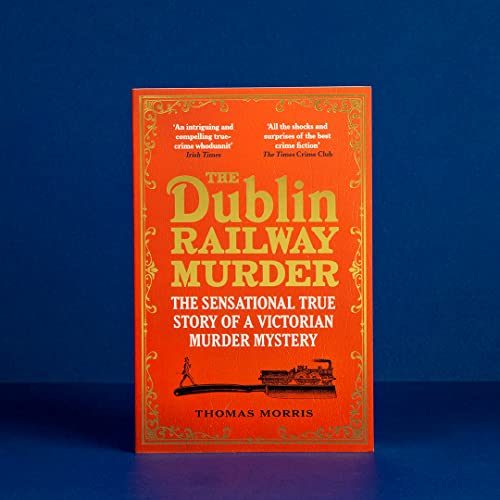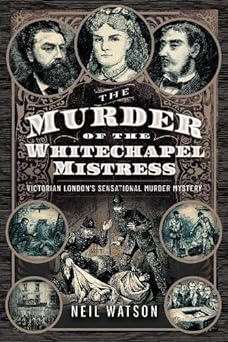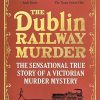The Dublin Railway Murder: The sensational true story of a Victorian murder mystery
£8.70£9.50 (-8%)
A thrilling investigation of a true Victorian crime at Dublin railway station, shortlisted for the CWA Gold Dagger for Non-Fiction 2022.
‘All the shocks and surprises of the best crime fiction’ The Times Crime Club
Dublin, November 1856: George Little, the chief cashier of the Broadstone railway terminus, is found dead, lying in a pool of blood beneath his desk.
Yet there is no sign of a murder weapon and the office door is locked, apparently from the inside. Thousands of pounds in gold and silver are left untouched at the scene of the crime.
Augustus Guy, Ireland’s most experienced detective, teams up with Dublin’s leading lawyer to investigate the murder – but the case defies all explanation. Then a local woman comes forward, claiming to know the killer…
‘An intriguing and compelling true-crime whodunnit’ Irish Times
‘A true-crime masterclass… As compelling as any thriller’ Philip Gray, author of Two Storm Wood
Read more
Additional information
| Publisher | Vintage (27 Oct. 2022) |
|---|---|
| Language | English |
| Paperback | 384 pages |
| ISBN-10 | 1529113008 |
| ISBN-13 | 978-1529113006 |
| Dimensions | 12.85 x 2.54 x 19.84 cm |









by Stewart L Robotham
I wasn’t aware of this murder but I found the book compelling and it moved along nicely.
by Toni Gray
Very detailed and it went on a bit, but it did hold my interest.
by CBS
I’m a resident of the city (‘a Dub’, as we say). I really like books strongly grounded in time and place, expressive of the associated atmosphere. So I had to buy this. Thomas Morris is Welsh. He is not a local. Yet I must congratulate him on his extraordinary knowledge of Dublin past and present. I admit freely that, from his book, I have learnt a lot about my own city. It’s also an education in the temper of the times in 1850s Dublin, when the railway was the Great New Thing and Ireland as a whole was in recovery from the Great Famine. The book is entirely factual, yet reads like (and has the page-turning urgency of) a novel. Bravo.
A senior clerk of the railway company is murdered at Dublin’s Broadstone station. It is a gruesome murder that for a long time defies the efforts of the greatest detectives of both Ireland and Britain. We are led through the event itself, the investigation, the trial and the aftermath. It is all factual: no latitude is taken with history, events, or the words attributed to the characters. This is possible because of the exhaustive records regarding the murder maintained in the Irish National Archives. And it sheds so much light not just on the murder and subsequent proceedings, but also the social history of the time in Dublin and Ireland. It’s great stuff.
If I have a gripe, it is that the book is almost too thorough. The pace is relaxed. The author seems determined to let no factoid remain uncovered, to avoid no opportunity for diversion down minor byways (why do we need to know that the great-great-great granddaughter of the Attorney General for Ireland (in 1856) is the contemporary British politician Amber Rudd?). Similarly, not every minor protagonist needs to be introduced with a potted biography. While all the gems are fascinating, the book as a whole would benefit from slightly tighter focus and editing.
That all said, a fascinatiing work, that this ‘native’ can endorse in terms of accuracy. Very good, and four-and-a-half stars, if such could be awarded.
by Lili
Very well-written account of a Victorian Era murder in Dublin. Well-paced and full of fascinating historical detail. The final chapters in particular are brilliant and really bring the criminal and the society he lives in to colourful life. Unforgettable.
by A man who loves to read a hardback amd defies critics and always leaves a review if any are sent
What a lovey author
by Michael Fletcher
This was a fascinating glimpse into the fallout of a brutal murder, the tortuous work of trying to track down the killer and the power, then as now, of ‘trial by press’ and public opinion. If Mr Morris weren’t so desperate at every turn, to take a dig at the English (outraged at the English press describing Dublin as a brutal place, with little sense of irony he makes gross and unflattering generalisations about London). He makes the case some kind of metaphor for imperial oppression (ignoring the fact that the vast majority of players in this case were Irishmen just trying to do their job), this could have been an excellent book. I’d happily read more from Mr Morris, if he can only lose the chip on his shoulder.
by Maurice CHITTENDEN
It’s a mystery worthy of Conan Doyle or Agatha Christie: a battered and mutilated body in a locked office at a busy railway terminus.
Thomas Morris does a good job steering us through the evidence and exploring who might be responsible. But is he himself stabbed in the back by the over-fussy publishers. When you pick up the book to read, try to avoid the map and the dramatis personae at the beginning because they rather give the game away too early.
by Bronwan Allen
Excellent